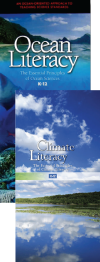Scientist-Educator Collaborative Workshop
Workshop Evaluation: Ocean & Climate Literacy |
|
Held at the Darling Marine Center in Walpole, ME
Friday, November 22, 2008 through Saturday, November 23, 2008 |
|
|
|
Using ocean and climate literacy principles that best align with the research areas of the workshop scientists, applicants are asked to rate
their comfort with and the relevance of the concepts to their own work. Following the workshop, educators are asked to indicate whether
changes occurred in their comfort with and their sense of the relevance of the same literacy concepts.
Literacy change data are presented in the charts below, color-coded as green ("preferred result"), yellow ("less preferred result"), and red
("negative result"). Our preferred result is: 1) they remained "very comfortable" with a principle or continued to find it "very relevant" after
the workshop; or 2) they were "more comfortable" with a literacy principle or felt it was "more relevant" after the workshop. Our less preferred
result is that the workshop failed to increase an initially moderate "comfort" or "relevance" rating for any principle. We consider any of the following to be a "negative result": 1) a decrease in "comfort" or "relevance" after the workshop; or 2) their post-workshop status remained either "somewhat" "not" comfortable / relevant or "don't know". To see a key with this information
here.
The degree to which comfort and relevance changed varied between concepts, some being less emphasized than others at the workshop. The following
chart provides a summary of those results ( download this chart as a PDF [192 KB]).
Life on Earth, including microbes, plants, and animals such as humans, can influence climate substantially and has throughout the evolution of life on the planet. |
 |
Observations, experiments, and theory used to construct and refine computer models and develop scientific explanations lead to better understanding of the linkages between the atmosphere-ocean system.... As a result, more reliable projections of future climate changes will develop over time.. |
 |
The carbon cycle influences climate in a variety of ways, including seasonal interactions between the atmosphere, biosphere, and hydrosphere, and the formation/consumption of fossil fuels. Carbon dioxide is removed from the atmosphere in the ocean and other parts of the Earth system through biologic and geologic processes. |
 |
The consensus of scientific opinion is that the natural processes driving Earth's long-term climate changes cannot entirely explain the rapid changes observed in recent decades, nor do they solely predict those projected for coming decades. |
 |
Human activities have affected the land, oceans and atmosphere and have altered regional and global climate. These activities include burning fossil fuels, releasing chemicals into the atmosphere, reducing the amount of forest cover, and rapidly expanding farming development and industrial activity. |
 |
The ocean has had, and will continue to have, a significant influence on climate change by absorbing, storing, and moving heat, carbon and water. |
 |
Most life in the ocean exists as microbes. Microbes are the most important primary producers in the ocean. Not only are they the most abundant life form in the ocean, they have extremely fast growth rates and life cycles. |
 |
New technologies, sensors and tools are expanding our ability to explore the ocean. Ocean scientists are relying more and more on satellites, drifters, buoys, subsea observatories and unmanned submersibles. |
 |
Use of mathematical models is now an essential part of ocean sciences. Models help us understand the complexity of the ocean and of its interaction with Earth's climate. They process observations and help describe the interactions among systems. |
 |
Quotes from Workshop Participants
"One of the other group's concept map[s] illustrated the interactions of the carbon cycle as a theme to move the understanding of the processes in climate change. I will utilize this map in my AP class."
"This [Ocean Literacy Concept #8] is fascinating to students because they like the techie stuff and can envision possible future careers."
"I have a great appreciation for microbes and will adjust my curriculum to include their ecological roles."
"This is a concept I was most uncomfortable with (mathematical models) - I now feel more confident in teaching it and will research the resources available in the assets."
|















